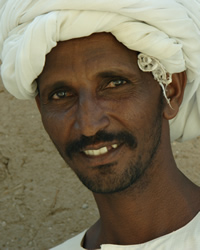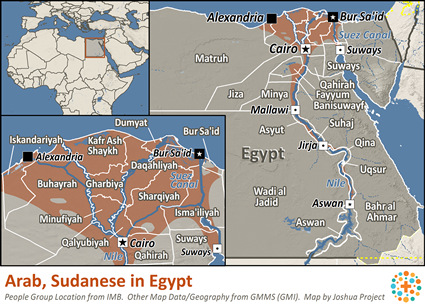Sudanese Arabs originated in the Khartoum region of Sudan many centuries ago. Today, they live primarily in northern and central Sudan and in Egypt. A few groups are also scattered in Saudi Arabia, Ethiopia, Libya, Yemen, and the United Arab Emirates.
The first "pure" Arabs were called "Bedouins." They were tribal nomads from Saudi Arabia, famous for their love of poetry and war. The Sudanese are a tribe who branched off of the Bedouins. They are a heterogeneous people with a mixture of diverse blood and cultures. They are more likely to be the results of marriages between Arabs and sub-Saharan Africans than other Arab groups.
Since 1983, conflict between the predominately north Arab and southern animist and Christian regions of the Sudan has accounted for more than two million deaths. Also tragic are the atrocities to non-Arab African groups on the Western Sudan/Chad border in the region of Darfur. Killings, mass rapes, looting of livestock and burning of villages by the Arab militia, Janjaweed, have devastated the area. For this reason, millions of Sudanese (including Arabs) have needed to leave, either to safer parts of Sudan or to other countries like Egypt.
Millions have fled to Egypt as war refugees through the years. Some stay temporarily while others are in Egypt permanently. Still others go back and forth between the two countries, using busses or boats to travel. It is difficult for Sudanese Arabs to gain Egyptian citizenship.
There is a certain rapport between Egyptian and Sudanese Arabs. They call themselves, “children of the Nile River,” and their histories have been intertwined for centuries. But there are limits as to how many Sudanese Arabs the Egyptians can take in without jeopardizing their own water and food supplies (not to mention jobs and housing). Sudanese Arabs without refugee status have trouble getting education for their children. Egyptian schools are already overcrowded. Churches and refugee groups have tried to fill the gap by establishing special refugee schools. There have been times when Sudanese Arab refugees have been mistreated by Egyptian authorities.
In the Arab culture, children are considered to be a family's greatest asset, providing both workers and security for the parents as they grow older. Although boys and girls may be raised together when they are young, they are treated differently. Mothers show great affection towards the boys, pampering them and responding to their every wish. Girls are shown some affection but are not pampered. The boys are taught by their fathers to obey and respect older males. Girls are taught the values of obedience to their future husbands. Teenagers are not permitted to have any contact with the opposite sex until after marriage.
The Sudanese Arabs are Muslims, as are most Arabs. Identification with the Islamic religion is one of the primary cultural characteristics of most Arabs. They are devoted to their faith, and this is evident in their daily life.
While the men gather in the local mosque five times a day for prayer, women meet in homes and have their own religious services, conducted by female religious leaders. Only on certain occasions are the women permitted inside the mosques.
According to Islamic law, a man may have up to four wives. Rules concerning marriage and divorce are held in accordance to what is written in the Koran. Regulations regarding inheritance, taxation, wartime, submission to those in authority, and the roles of family members can also be found there.
Sudanese Arabs live in a country engulfed by tension, terror, and war. Even more than the physical provisions that are so badly needed in the Sudan, Sudanese Arabs need to hear about the saving love of Jesus. They have some Christian resources available to them. But churches are often closed, destroyed, or not allowed to be built. Converts from the Muslim faith are not well accepted. They will need courage and grace to withstand persecution from their Islamic relatives.
Pray for additional Bibles and Christian literature to be provided and placed.
Ask God to bring natural and spiritual peace to Sudanese Arabs in Egypt.
Ask the Lord to call out prayer teams to go and break up the soil through worship and intercession.
Pray that God will raise up long term workers to join those who have already responded.
Pray that the Holy Spirit will complete the work begun in their hearts through adequate discipleship.
Pray that the Holy Spirit will anoint Christian broadcasts as they are aired among the Sudanese Arabs.
Ask the Lord to raise up strong local churches among the Sudanese Arabs for the glory of his name!
Scripture Prayers for the Arab, Sudanese in Egypt.
https://en.wikipedia.org/wiki/Sudanese_refugees_in_Egypt
https://www.npr.org/2023/06/15/1180995848/sudan-war-egypt-nubia-ties
https://www.bbc.com/news/world-africa-65351460
https://web.archive.org/web/20070311154717/http://weekly.ahram.org.
| Profile Source: Joshua Project |



























